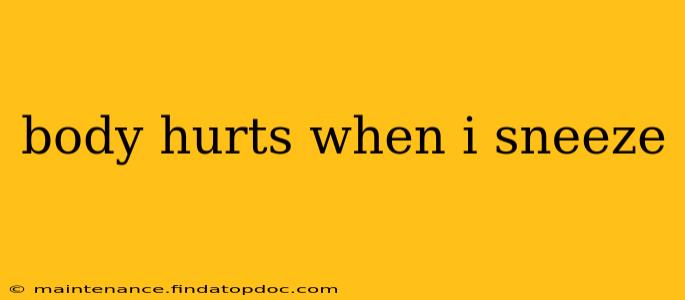Sneezing, that involuntary, explosive expulsion of air from your lungs, is usually a relatively harmless bodily function. However, for many, a sneeze can be accompanied by a surprising and sometimes alarming pain throughout the body. This isn't necessarily a sign of something serious, but understanding the potential causes can help alleviate worry and manage discomfort.
Why Does My Body Hurt When I Sneeze?
The pain experienced during a sneeze stems from the sheer force involved in the process. Think about it: your body is suddenly expelling air at high velocity, putting significant pressure on various internal organs and muscles. This pressure can manifest as pain in several areas.
Increased Intra-abdominal Pressure
A sneeze is essentially a powerful contraction of your abdominal and chest muscles. This sudden, intense pressure increase in your abdomen can cause pain or discomfort, particularly if you already have underlying conditions like:
- Hernia: A hernia involves a protrusion of an organ through a weakened muscle wall. The pressure from a sneeze can exacerbate this, leading to significant pain.
- Abdominal muscle strain or injury: Existing muscle injuries or weakness can be aggravated by the forceful contractions of a sneeze.
- Constipation: Increased abdominal pressure can worsen constipation and related discomfort.
Impact on Other Body Parts
Beyond the abdomen, the intense pressure can reverberate throughout the body, affecting other areas. This can lead to:
- Headache: The pressure surge can trigger or worsen headaches, especially migraines or tension headaches.
- Back pain: The sudden forceful contraction of muscles can cause pain in the lower back, particularly in individuals with pre-existing back problems.
- Rib pain: In some cases, the pressure can cause sharp pain in the rib cage. This is often temporary and resolves quickly.
What Can I Do to Reduce the Pain?
Fortunately, there are several ways to minimize or manage the pain associated with sneezing:
- Gentle Support: Try gently supporting your abdomen with your hands while sneezing to reduce the pressure buildup. This can provide a degree of support and lessen the intensity of the force.
- Controlled Sneezing: If possible, try to stifle a sneeze by gently closing your mouth and nose. This isn't always feasible, but it can lessen the force if done safely and carefully.
- Manage Underlying Conditions: Address any pre-existing conditions, such as hernias, abdominal muscle strains, or back problems. Treating these issues can significantly reduce pain during sneezing.
- Pain Relief: Over-the-counter pain relievers, such as ibuprofen or acetaminophen, can help manage pain if it becomes severe or persistent.
When to See a Doctor
While most instances of pain during sneezing are benign, it's crucial to consult a doctor if:
- The pain is severe or persistent.
- You experience other concerning symptoms alongside the pain.
- The pain occurs frequently and interferes with daily activities.
Frequently Asked Questions
Why does my head hurt after I sneeze?
The sudden pressure change during a sneeze can trigger headaches, particularly in individuals predisposed to migraines or tension headaches. The intensity of the headache can vary depending on the individual and the intensity of the sneeze.
Why does my back hurt when I sneeze?
Back pain following a sneeze often relates to pre-existing back problems. The sudden forceful contractions associated with sneezing can aggravate underlying conditions like muscle strains, spinal issues, or hernias, leading to pain in the lower back.
Why does my stomach hurt after I sneeze?
The intense contraction of abdominal muscles during a sneeze can cause abdominal pain, especially if you have a pre-existing condition such as a hernia or abdominal muscle strain. The pressure increase within the abdominal cavity can exacerbate these issues.
Is it normal to hurt all over after a sneeze?
While uncommon, it's possible to experience generalized discomfort or pain after a forceful sneeze. This is often due to the widespread pressure changes and muscle contractions involved in the process. However, if this is frequent or severe, seeking medical attention is recommended.
Remember, while a sneeze-related ache is often harmless, paying attention to your body and seeking professional medical advice when necessary is always the best approach to ensure your wellbeing. This information is for general knowledge and should not replace professional medical advice. Always consult a doctor for any health concerns.
